目录
- 一、Code First 代码优先
- 二、创建或生成Model代码
- 1、从数据库生成Model代码
- 2、手工创建Model代码
- 三、配置文件
- 四、操作
- 1、添加单个实体,Add
- 2、修改
- 3、删除,Remove
- 五、查询
- 1、Load():
- 2、ToList():
- 3、Find():
- 4、Single()、SingleOrDefault()、First()等:
- 六、直接执行SQL语句
- 1、在实体上运行SQL命令,
- 2、在Database属性上运行SQL命令
一、Code First 代码优先
DbContext可以用于数据库优先,代码优先和模型优先的开发。
DbContext主要包含一组非常易于使用的API。该API由ObjectContext公开。这些API还允许我们使用ObjectContext不允许的Code First方法。
DbContext只是ObjectContext包装器,可以说它是ObjectContext的轻量级替代方案。
1、从ObjectContext转化到DbContext
DbContext ctx= new DbContext(ctxObj , true);
EF6支持Oracle ODT 12C Release 3 (net4.5)以上
二、创建或生成Model代码
1、从数据库生成Model代码
可以使用高级的反向工程工具POCO生成器模板(收费)。https://marketplace.visualstudio.com/items?itemName=SimonHughes.EntityFrameworkReversePOCOGenerator
一般使用Visual Studio EF 6工具附带的不太高级的“"Code First from Database" ”功能。
实体框架提供了一种对现有数据库使用代码优先方法的简便方法。它将为现有数据库中的所有表和视图创建实体类,并使用数据注释属性和Fluent API对其进行配置。
要将代码优先用于现有数据库,请在Visual Studio中右键单击您的项目->添加->新建项。
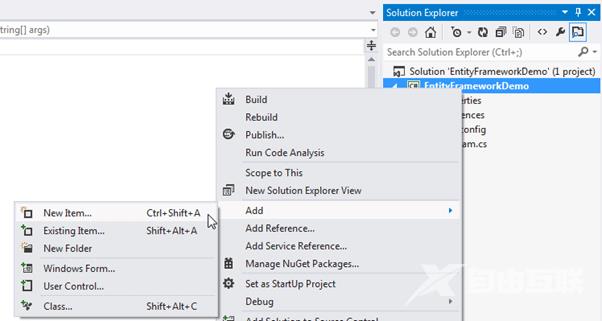
在“添加新项”对话框中选择“ADO.NET实体数据模型”,并指定模型名称(这将是上下文类名称),然后单击“添加”。
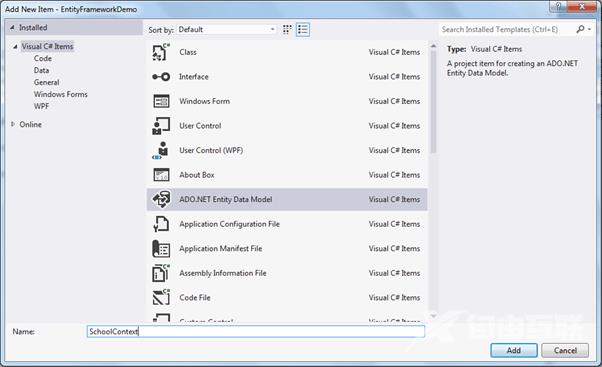
这将打开“实体数据模型”向导,如下所示。从数据库选项中选择代码优先,然后单击下一步。
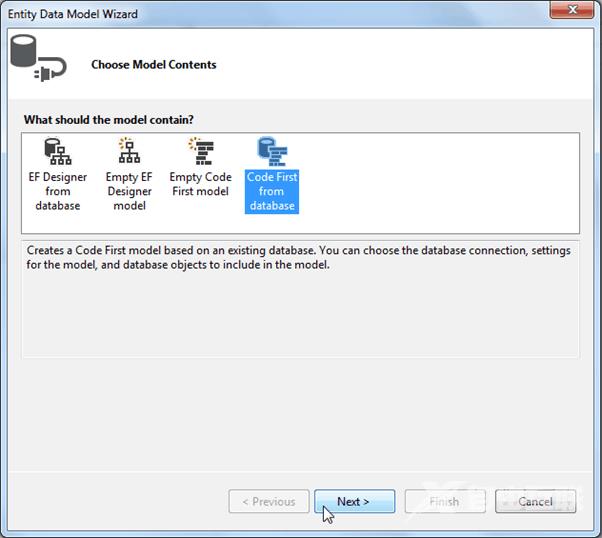
现在,为现有数据库选择数据连接。如果下拉列表不包括与现有数据库的连接,请为您的数据库创建一个新连接。单击下一步继续。
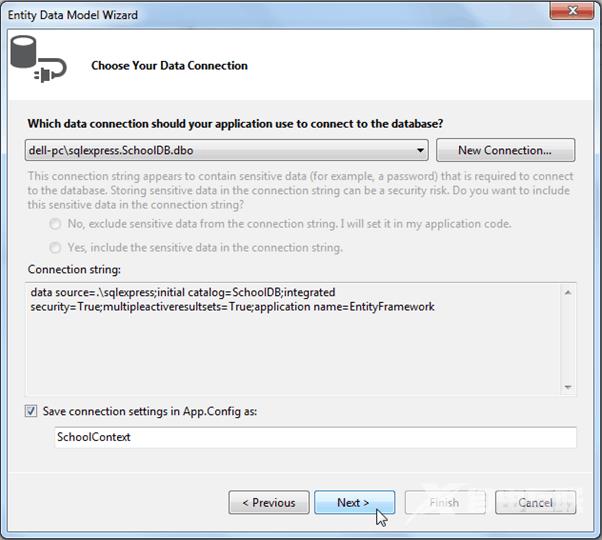
现在,选择要为其生成类的表和视图,然后单击“完成”。
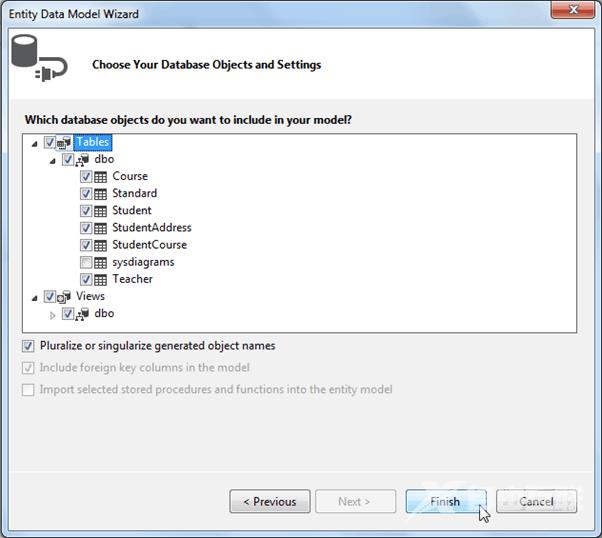
这将为您的数据库表和视图生成所有实体类,如下所示。

例如,它将创建以下上下文类,该上下文类使用Fluent API根据数据库配置实体类。
namespace EFDemo
{
using System;
using System.Data.Entity;
using System.ComponentModel.DataAnnotations.Schema;
using System.Linq;
public partial class SchoolContext : DbContext
{
public SchoolContext()
: base("name=SchoolContext2")
{
}
public virtual DbSet<Course> Courses { get; set; }
public virtual DbSet<Standard> Standards { get; set; }
public virtual DbSet<Student> Students { get; set; }
public virtual DbSet<StudentAddress> StudentAddresses { get; set; }
public virtual DbSet<Teacher> Teachers { get; set; }
public virtual DbSet<View_StudentCourse> View_StudentCourse { get; set; }
protected override void OnModelCreating(DbModelBuilder modelBuilder)
{
modelBuilder.Entity<Course>()
.Property(e => e.CourseName)
.IsUnicode(false);
modelBuilder.Entity<Course>()
.HasMany(e => e.Students)
.WithMany(e => e.Courses)
.Map(m => m.ToTable("StudentCourse").MapLeftKey("CourseId").MapRightKey("StudentId"));
modelBuilder.Entity<Standard>()
.Property(e => e.StandardName)
.IsUnicode(false);
modelBuilder.Entity<Standard>()
.Property(e => e.Description)
.IsUnicode(false);
modelBuilder.Entity<Standard>()
.HasMany(e => e.Students)
.WithOptional(e => e.Standard)
.WillCascadeOnDelete();
modelBuilder.Entity<Standard>()
.HasMany(e => e.Teachers)
.WithOptional(e => e.Standard)
.WillCascadeOnDelete();
modelBuilder.Entity<Student>()
.Property(e => e.StudentName)
.IsUnicode(false);
modelBuilder.Entity<Student>()
.Property(e => e.RowVersion)
.IsFixedLength();
modelBuilder.Entity<Student>()
.HasOptional(e => e.StudentAddress)
.WithRequired(e => e.Student)
.WillCascadeOnDelete();
modelBuilder.Entity<StudentAddress>()
.Property(e => e.Address1)
.IsUnicode(false);
modelBuilder.Entity<StudentAddress>()
.Property(e => e.Address2)
.IsUnicode(false);
modelBuilder.Entity<StudentAddress>()
.Property(e => e.City)
.IsUnicode(false);
modelBuilder.Entity<StudentAddress>()
.Property(e => e.State)
.IsUnicode(false);
modelBuilder.Entity<Teacher>()
.Property(e => e.TeacherName)
.IsUnicode(false);
modelBuilder.Entity<Teacher>()
.HasMany(e => e.Courses)
.WithOptional(e => e.Teacher)
.WillCascadeOnDelete();
modelBuilder.Entity<View_StudentCourse>()
.Property(e => e.StudentName)
.IsUnicode(false);
modelBuilder.Entity<View_StudentCourse>()
.Property(e => e.CourseName)
.IsUnicode(false);
}
}
}
EF 6有用的设计时实用程序:https://marketplace.visualstudio.com/items?itemName=ErikEJ.EntityFramework6PowerToolsCommunityEdition

2、手工创建Model代码
方式1、使用标注
using System.Collections.Generic;
using System.ComponentModel.DataAnnotations.Schema;
namespace CodeFirst.Model
{
///
/// 目的景点类
///
[Table("DESTINATIONS", Schema = "PAMS")]
public class Destination
{
[Column("DESTINATIONID", TypeName = "INT")]
[DatabaseGeneratedAttribute(DatabaseGeneratedOption.Identity)]
public int DestinationId { get; set; }
[Column("NAME")]
public string Name { get; set; }
[Column("COUNTRY")]
public string Country { get; set; }
[Column("DESCRIPTION")]
public string Description { get; set; }
[Column("PHOTO")]
public byte[] Photo { get; set; }
public virtual List Lodgings { get; set; } //景点带有多个住宿点
}
///
/// 住宿类
///
[Table("LODGINGS", Schema = "PAMS")]
public class Lodging
{
[Column("LODGINGID", TypeName = "INT")]
[DatabaseGeneratedAttribute(DatabaseGeneratedOption.Identity)]
public int LodgingId { get; set; }
[Column("NAME")]
public string Name { get; set; }
[Column("OWNER")]
public string Owner { get; set; }
[Column("TARDESTINATIONID", TypeName = "INT")]
public int? DestinationID { get; set; }
[ForeignKey("DestinationID")]
public Destination Destination { get; set; }
}
///
/// 度假村类,继承自住宿类
///
public class Resort : Lodging
{
[Column("ENTERTAINMENT")]
public string Entertainment { get; set; }
}
///
/// 旅馆类,继承自住宿类
///
public class Hostel : Lodging
{
[Column("MAXROOM", TypeName = "INT")]
public int? MaxRoom { get; set; }
}
}
方式2:使用模板Builder“配置”属性和关系
using CodeFirst.Model;
using System.Data.Entity;
using System.Data.Entity.ModelConfiguration;
namespace CodeFirst.DataAccess
{
public class BreakAwayContext : DbContext
{
public DbSet Destinations { get; set; }
public DbSet Lodgings { get; set; }
protected override void OnModelCreating(DbModelBuilder modelBuilder)
{
modelBuilder.Configurations.Add(new DestinationMap());
modelBuilder.Configurations.Add(new LodgingMap());
}
}
public class DestinationMap : EntityTypeConfiguration
{
public DestinationMap()
{
this.HasKey(t => t.DestinationId);
Property(d => d.Name).IsRequired();
Property(d => d.Description).HasMaxLength(500);
}
}
public class LodgingMap : EntityTypeConfiguration
{
public LodgingMap()
{
this.HasKey(t => t.LodgingId);
Property(d => d.Name).IsRequired();
Property(d => d.Owner).HasMaxLength(500);
this.Map(d => d.Requires("TYPE").HasValue("Standard"));
this.Map(d => d.Requires("TYPE").HasValue("Resort"));
this.Map(d => d.Requires("TYPE").HasValue("Hostel"));
}
}
}
三、配置文件
<connectionStrings>
<add name="BreakAwayContext" connectionString="Data Source=(localdb)\MSSQLLocalDB;Initial Catalog=BreakAway;Integrated Security=True;Connect Timeout=30;Encrypt=False;TrustServerCertificate=False;ApplicationIntent=ReadWrite;MultiSubnetFailover=False" providerName="System.Data.SqlClient"/>
</connectionStrings>
四、操作
1、添加单个实体,Add
var destination = new CodeFirst.Model.Destination
{
Country = "Indonesia",
Description = "EcoTourism at its best in exquisite Bali",
Name = "Bali"
};
using (var context = new CodeFirst.DataAccess.BreakAwayContext())
{
if (context.Destinations.Count((t => t.Name == "Bali") < 1)
{
context.Destinations.Add(destination);
context.SaveChanges();
}
}
2、修改
using (var context = new CodeFirst.DataAccess.BreakAwayContext())
{
var canyon = (from d in context.Destinations where d.Name == "Bali" select d).Single();
canyon.Description = "227 mile long canyon.";
//context.Entry(canyon )=EntityState.Modified;
context.SaveChanges();
}
3、删除,Remove
var toDelete = new CodeFirst.Model.Destination { Name = "Bali" };
context.Destinations.Attach(toDelete); //attach
context.Destinations.Remove(toDelete);
context.SaveChanges();
五、查询
1、Load():
把数据加载到内存,使用实体的Local属性访问。(LINQ写法,同foreach)
using (var context = new CodeFirst.DataAccess.BreakAwayContext())
{
var query = from d in context.Destinations where d.Country == "Australia" select d;
query.Load();// foreach 也可以
var count = context.Destinations.Local.Count;
}
2、ToList():
一次性从数据库中查出数据
var Invoices=ctx.Invoie.ToList();
foreach(var result in Onvoices)
{.}
3、Find():
根据键值先从内存中查询,内存中没有才查询数据库。
var destination = context.Destinations.Find(4);
4、Single()、SingleOrDefault()、First()等:
可根据条件直接从数据库查。
var destination = context.Destinations.SingleOrDefault(d => d.Name == "Bali");
六、直接执行SQL语句
1、在实体上运行SQL命令,
SQL查询:SqlQuery
DbSqlQuery c = ctx.Lodging.SqlQuery("select * from.."); //EF跟踪返回的对象。
2、在Database属性上运行SQL命令
1、SQL查询:Database.SqlQuery
IEnumerable a = ctx.Database.SqlQuery("Select * from.."); //可直接转为定义的实体类型,任何类型,EF不跟踪
2、执行SQL命令:Database.ExecuteSqlCommand
ctx.Database.ExecuteSqlCommand("delete from pams.DESTINATIONS where Name='Bali'");//直接执行sql
到此这篇关于Entity Framework代码优先(Code First)的文章就介绍到这了。希望对大家的学习有所帮助,也希望大家多多支持自由互联。
